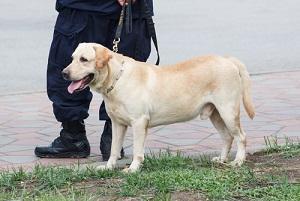Drug Sniffing Dogs and Your Fourth Amendment Rights
 Most criminal charges related to drug possession and other drug crimes are largely based on the evidence found by law enforcement during a search of a suspect’s property—often a home or vehicle. The United States Constitution, however, places very strict limits on how and when law enforcement officers may conduct such searches so that the Fourth Amendment rights of the suspect are not compromised. In most cases, the police must obtain a warrant from a judge authorizing the search based on probable cause that the search will yield useful evidence, illegal weapons, or drugs. The other alternative is for the suspect to allow the search when requested, though granting such permission is not often a good idea.
Most criminal charges related to drug possession and other drug crimes are largely based on the evidence found by law enforcement during a search of a suspect’s property—often a home or vehicle. The United States Constitution, however, places very strict limits on how and when law enforcement officers may conduct such searches so that the Fourth Amendment rights of the suspect are not compromised. In most cases, the police must obtain a warrant from a judge authorizing the search based on probable cause that the search will yield useful evidence, illegal weapons, or drugs. The other alternative is for the suspect to allow the search when requested, though granting such permission is not often a good idea.
As police investigatory techniques evolve, controversies often arise regarding whether creative procedures place a citizen’s constitutional rights in jeaopardy. Such was the issue before the United States Supreme Court several years ago as it considered the constitutionality of the use of drug-sniffing dogs on a suspect’s property before obtaining a search warrant.
Florida v. Jardines
In the fall of 2012, the U.S. Supreme Court heard arguments in Florida v. Jardines, a case filed as the result of an arrest that started with a drug-sniffing dog being brought to the suspect’s front door without a warrant. The high court was tasked with determining whether a sniff by a drug-sniffing dog constituted a “search” for the purposes of protecting Fourth Amendment rights. Prosecutors and police officials maintained that the dog never entered the man’s home and that it is reasonable for anyone to expect visitors to one’s front door, including law enforcement officers.
The defendant’s team argued that it is understandable for a police officer to knock on the door and speak to the residents without a warrant, but not to conduct what amounts to a drug search with a trained animal without a warrant. By a 5-4 margin in March 2013, the court agreed that the introduction of a drug-sniffing dog is, in effect, a search, and, as such, requires a warrant based probable cause. Even though a warrant was later issued before law enforcement entered the house, the warrant was based on the dog’s behavior indicating the presence of illegal drugs and was, therefore, tainted.
Somewhat Limited Scope
The late Justice Antonin Scalia wrote the majority opinion clarifying that the court’s ruling regarding drug-sniffing dogs is not applicable to every circumstance. Justice Scalia quoted previous decisions in stating that the court considered the area “immediately surrounding and associated with the home” to be “part of the home itself for Fourth Amendment purposes.” The court, however, did not address the drug-sniffing dogs used in traffic stops, airports, or on public property, thereby limiting the scope of the ruling.
Protect Your Rights
If you have been arrested due to evidence found in a search that you believe violated your Fourth Amendment rights, contact an experienced Chicago criminal defense attorney immediately. Call Luisi Legal Group at 773-276-5541 for a free consultation today.
Sources:
http://nation.time.com/2013/03/28/supreme-court-says-a-dogs-sniff-can-be-a-fourth-amendment-intrusion/
https://www.law.cornell.edu/supremecourt/text/11-564
http://www.scotusblog.com/2013/03/opinion-issued-in-florida-v-jardines/







